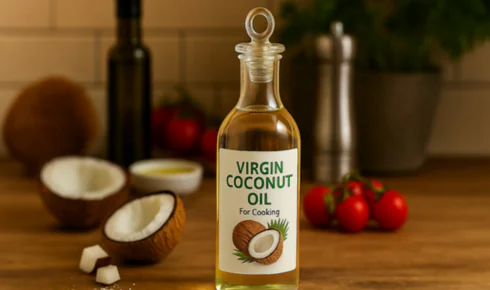Virgin Coconut Oil: The Tropical Secret to Healthier Cooking

Virgin coconut oil (VCO) is a popular, natural oil that brings the exotic flavors and incredible health benefits of the coconut to your kitchen. Often called Extra Virgin Coconut Oil or simply Unrefined Coconut Oil, it’s a pure, wholesome fat extracted from fresh coconut meat. Unlike highly processed oils, VCO retains its delightful coconut aroma, distinct taste, and powerful nutrients, making it a fantastic and flavorful addition to almost any meal.
Why Choose Virgin Coconut Oil for Your Kitchen?
The appeal of virgin coconut oil for cooking goes beyond its tropical taste. Its unique composition and the way it’s made provide clear advantages over many other cooking fats.
Pure Processing and Sustainable Sourcing
The quality of VCO starts long before it reaches your pantry. True virgin coconut oil is extracted from fresh coconuts without harsh chemicals, bleaching, or deodorizing.
- Expert Processing Methods: The finest VCO is typically made using cold-pressed or centrifuge extraction methods. These gentle techniques keep the oil from being exposed to excessive heat, which helps to preserve the natural flavor, aroma, and beneficial compounds found in the fresh coconut.
- Sustainable Sourcing: Look for products labeled virgin coconut oil organic. This ensures the coconuts were grown without the use of synthetic fertilizers or pesticides, supporting healthier farming practices and a more sustainable environment. Choosing sustainably sourced VCO helps support local communities and protect the land.
The Power of Medium-Chain Triglycerides (MCTs)
VCO is an excellent source of Medium-Chain Triglycerides (MCTs), which are fats that your body handles differently than most other dietary fats.
- Fast, Efficient Energy: When you eat MCTs, they are quickly absorbed and sent straight to your liver, where they can be rapidly converted into energy. This process is highly efficient and is less likely to be stored as body fat, providing a fantastic, clean energy boost.
- Unique Fatty Acid Profile: Around 50% of the fat in VCO is a specific MCT called lauric acid. This compound is renowned for its antimicrobial properties and is converted by your body into monolaurin, which helps support your immune system.
Mastering the Art of Cooking with VCO
Because of its unique composition, it’s important to know the best ways to use virgin coconut oil in the kitchen to maximize both its flavor and its health benefits.
Ideal Cooking Applications
Virgin coconut oil has a medium smoke point (about 350∘F or 177∘C). The smoke point is the temperature at which an oil begins to burn and lose its beneficial properties. Therefore, it is best suited for:
- Baking: It works perfectly as a 1:1 substitute for butter, margarine, or other oils in recipes for cookies, muffins, and cakes, giving them a rich, moist texture and a subtle, sweet coconut note.
- Light Sautéing and Stir-Frying: Use it for cooking eggs, pancakes, or lightly sautéing vegetables over low to medium heat. The tropical flavor is especially wonderful in curries, rice dishes, and Asian-inspired stir-fries.
- As a Healthy Spread: Since it is solid at room temperature, it can be spread on toast, bagels, or muffins as a delightful, dairy-free alternative to butter.
- In Beverages and Smoothies: Stir a teaspoon into your morning coffee or blend it into your favorite fruit smoothie to add healthy fats and a boost of lasting energy.
A Quick Tip for Use
Virgin coconut oil organic is solid below 76∘F (24∘C). If your recipe requires liquid oil, simply scoop out the needed amount and gently melt it in a small saucepan or microwave. When substituting for solid fats like butter in baking, be sure your other ingredients are at room temperature to prevent the melted VCO from re-solidifying into lumps.
For inquiries about our sustainably sourced, organic virgin coconut oil and for bulk orders, please contact our team:
WhatsApp: (+62)812 1233 3590 (Ms.Maria) Email: [email protected]





